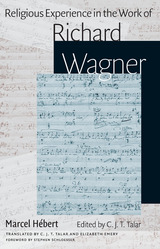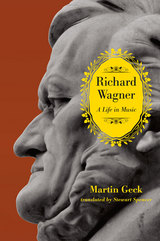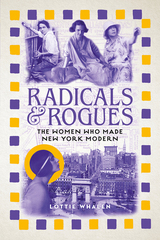3 books about Richard Wagner

Religious Experience in the Work of Richard Wagner
Marcel Hebert
Catholic University of America Press, 2015
Philosopher Marcel Hébert developed his Religious Experience in the Work of Richard Wagner (1895) from this background of sustained popular interest in Wagner, an interest that had intensified with the return of his operas to the Paris stage. Newspaper debates about the impact of Wagner's ideas on French society often stressed the links between Wagner and religion. These debates inspired works like Hébert's, intended to explain the complex myth and allegory in Wagner's work and to elucidate it for a new generation of French spectators.
[more]

Richard Wagner
Raymond Furness
Reaktion Books, 2013
With their complex textures, rich harmonies, and elaborate use of leitmotifs, the operas of German composer Richard Wagner (1813–83) remain some of the most influential—and contentious—in the history of the genre. But while he won renown with what he achieved on the stage, his life was marked by political exile, turbulent love affairs, and poverty. And because Wagner and his music are exceedingly intertwined with the great upheavals of his time, it is difficult to produce an impartial assessment of his output. Appearing at the bicentennial of his birth, Richard Wagner provides a clear and balanced view of both Wagner’s great successes and the controversies generated by his life and art.
Using Wagner’s wide-ranging engagement with mythology as a starting point, Raymond Furness explores the composer’s music and prose writings. He delves deeply into Wagner’s essential operas, such as The Ring and Tristan and Isolde, offering fascinating insight into these works. Because the great operatic pieces often overshadow the rest of Wagner’s compositions, Furness also considers neglected fragments like “Wieland the Smith,” “The Mines at Falun,” and “The Visitors,” producing a more rounded critical picture of the composer. With up-to-date dissections of recent Bayreuth productions and a refreshingly uncluttered approach to a much-misunderstood life, Richard Wagner is an engaging look at one of music’s most beguiling figures.
[more]

Richard Wagner
A Life in Music
Martin Geck
University of Chicago Press, 2013
Best known for the challenging four-opera cycle The Ring of the Nibelung, Richard Wagner (1813–83) was a conductor, librettist, theater director, and essayist, in addition to being the composer of some of the most enduring operatic works in history, such as The Flying Dutchman, Tannhäuser, and Tristan and Isolde. Though his influence on the development of European music is indisputable, Wagner was also quite outspoken on the politics and culture of his time. His ideas traveled beyond musical circles into philosophy, literature, theater staging, and the visual arts. To befit such a dynamic figure, acclaimed biographer Martin Geck offers here a Wagner biography unlike any other, one that strikes a unique balance between the technical musical aspects of Wagner’s compositions and his overarching understanding of aesthetics.
Wagner has always inspired passionate admirers as well as numerous detractors, with the result that he has achieved a mythical stature nearly equal to that of the Valkyries and Viking heroes he popularized. There are few, if any, scholars today who know more about Wagner and his legacy than Geck, who builds upon his extensive research and considerable knowledge as one of the editors of the Complete Works to offer a distinctive appraisal of the composer and the operas. Using a wide range of sources, from contemporary scholars to the composer’s own words, Geck explores key ideas in Wagner’s life and works, while always keeping the music in the foreground. Geck discusses not only all the major operas, but also several unfinished operas and even the composer’s early attempts at quasi-Shakespearean drama.
Richard Wagner: A Life in Music is a landmark study of one of music’s most important figures, offering something new to opera enthusiasts, Wagnerians, and anti-Wagnerians alike.
[more]
READERS
Browse our collection.
PUBLISHERS
See BiblioVault's publisher services.
STUDENT SERVICES
Files for college accessibility offices.
UChicago Accessibility Resources
home | accessibility | search | about | contact us
BiblioVault ® 2001 - 2024
The University of Chicago Press









